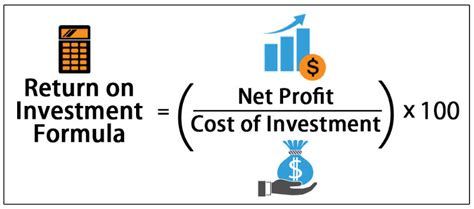How to Calculate Return on Investment (ROI) and Why It Matters
Return on Investment (ROI) is a crucial metric for evaluating the profitability of any investment, whether it's a marketing campaign, a new piece of equipment, or a stock investment. Understanding how to calculate ROI and interpret the results is essential for making informed business decisions and maximizing your returns. This guide will walk you through the process, offering clear examples and explanations.
Understanding ROI: What Does It Tell You?
ROI expresses the efficiency of an investment. It tells you how much profit you've earned (or lost) in relation to the cost of the investment. A higher ROI indicates a more successful investment. It's a simple yet powerful tool for comparing different investment opportunities and assessing the effectiveness of various strategies.
The ROI Formula: A Simple Calculation
The basic ROI formula is straightforward:
ROI = [(Gain from Investment - Cost of Investment) / Cost of Investment] x 100%
Let's break down each component:
- Gain from Investment: This represents the total profit you made from the investment. This could be revenue generated, cost savings realized, or an increase in asset value.
- Cost of Investment: This is the total amount you spent on the investment. This includes all initial costs as well as any ongoing expenses associated with the investment.
Example Calculations: Bringing ROI to Life
Let's illustrate the ROI calculation with some practical examples:
Example 1: Marketing Campaign ROI
Suppose you invested $5,000 in a marketing campaign and generated $15,000 in additional revenue. Here's how you would calculate the ROI:
ROI = [($15,000 - $5,000) / $5,000] x 100% = 200%
This means your marketing campaign yielded a 200% return on your investment.
Example 2: Investment in New Equipment
Imagine purchasing new equipment for $10,000 that resulted in $2,000 in annual cost savings for the next five years. To calculate the ROI over five years:
Total Cost Savings = $2,000/year * 5 years = $10,000
ROI = [($10,000 - $10,000) / $10,000] x 100% = 0%
In this case, your ROI is 0%, meaning your investment recouped its cost. It's important to note the analysis is only considering financial factors. The equipment may have other valuable benefits, such as improved production quality or speed.
Example 3: Stock Investment
You bought 100 shares of a stock at $50 per share and sold them later at $75 per share.
Total Investment Cost = 100 shares * $50/share = $5,000
Total Revenue from Sale = 100 shares * $75/share = $7,500
ROI = [($7,500 - $5,000) / $5,000] x 100% = 50%
Interpreting Your ROI Results
- Positive ROI: Indicates a profitable investment. The higher the percentage, the better the return.
- Negative ROI: Signifies a loss on your investment.
- Zero ROI: Means the investment neither generated a profit nor a loss; the return is equal to the initial investment.
Beyond the Basic Calculation: Considerations for Accurate ROI
While the basic formula is useful, achieving a truly accurate ROI requires considering several factors:
- Time Value of Money: A dollar today is worth more than a dollar in the future due to inflation and potential investment opportunities. For long-term investments, incorporating time value of money using techniques like Net Present Value (NPV) can provide a more accurate picture.
- Indirect Costs: Include all associated expenses, even seemingly minor ones.
- Intangible Benefits: Factor in qualitative benefits that might not be immediately quantifiable, such as improved brand reputation or increased customer satisfaction.
By understanding the nuances of ROI calculation and incorporating these additional considerations, you'll be better equipped to make sound investment decisions and drive greater profitability.
